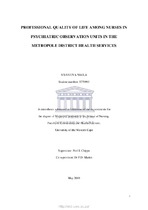| dc.description.abstract | Background: Psychiatric observation units are the units where 72-hour psychiatric observations are conducted in the district and in some of the regional hospitals. These hospitals were selected under the Mental Health Care Act No. 17 of 2002 (MHCA 2002) to admit patients suspected to be mentally ill, ascertain the cause of symptoms, exclude medical illness as a cause of the symptoms, treat and rehabilitate these patients; and at times transfer the patients to tertiary psychiatric hospitals. These units are often overcrowded as only about 30% of patients are transferred to the tertiary psychiatric hospitals. These units are fraught with challenges such as shortage of crucial facilities like seclusion rooms, specialised staff, resources and minimal budget is allocated to these units. Nursing staff in these units are faced with a number of challenges such as shortage of staff, patient overflow, prolonged patient stay, psychologically disturbed patients who can be agitated and violent, and are working long hours. Therefore, Compassion Satisfaction may be affected and these nurses are prone to Compassion Fatigue, which can lead to low Professional Quality of Life.
Aim & objectives: The aim was to investigate Professional Quality of Life among nurses working in psychiatric observation units in Metropole District Health Services in the Western Cape Metropole. The objectives were to measure Compassion Satisfaction, to measure levels of Burnout and determine levels of Secondary Traumatic Stress among nurses working in psychiatric observation units in the Metropole District Health Services.
Method: A quantitative research approach using a descriptive design was used to determine the Professional Quality of Life of nurses working in psychiatric observation units in the Metropole District Health Services. A self-administered survey using a structured questionnaire, the Professional Quality of Life version 5 (ProQoL 5) was used to collect data from an all-inclusive sample of 175 nurses, yielding a response rate of 93% (n=163). Data was analysed using the Statistical Package of Social Services (SPSS) version 24.
Findings: The findings of this study showed that respondents experienced moderate Compassion Satisfaction, moderate Burnout and high Secondary Traumatic Stress. Advanced psychiatric nurse practitioners and registered nurses reported lower Compassion Satisfaction, higher Burnout and higher Secondary Traumatic Stress than enrolled nurses and enrolled nursing assistants.
Recommendations: Qualitative research studies need to be conducted on nurses working in psychiatric observation units in order to understand experiences and factors affecting Professional Quality of Life among nurses. Qualitative research studies need to be conducted in order to understand factors affecting Professional Quality of Life of advanced psychiatric nurse practitioners and general registered nurses in psychiatric observations units. | en_US |

